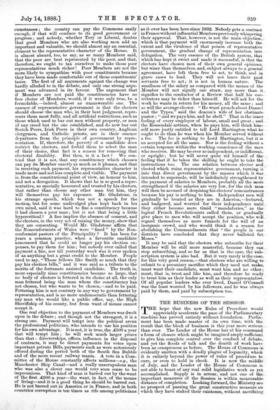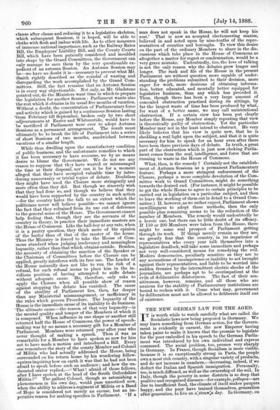THE BUSINESS OF THE SESSION. T HE hope that the new
Rules of Procedure would appreciably accelerate the pace of the Parliamentary machine has proved entirely without foundation. Parlia- ment has been made master of its own time, with the result that the block of business is this year more serious. than ever. The Leader of the House has at his command a form of closure which might be imagined amply sufficient to give him complete control over the conduct of debate, and yet the floods of talk and the dearth of work have been as conspicuous as before. The House of Commons is evidently smitten with a c1.6adly plague of loquacity, which it is entirely beyond the power of rules of procedure to cure, or even to hold in check. It is now the middle of July, and the Leader of the House of Commons is not able to boast of any real solid legislative work as yet accomplished. Supply is in a•rrear, and not one of the. important measures of the Session is within measurable distance of completion. Looking forward, the Ministry see no prospect of passing the great constructive measure on which they have staked their existence, without sacrificing 'clause after clause and reducing it to a legislative skeleton, which subsequent Sessions, it is hoped, will be able to clothe with flesh and imbue with life. As to other measures of immense national importance, such as the Railway Rates Bill, the Employers' Liability Bill, and the County Courts Bill, which have been patiently considered and moulded into shape by the Grand Committees, the Government can only manage to save them by the very questionable ex- pedient of an autumn Session. An Autumn Session may lie—we have no doubt it is—necessary to prevent what Mr. 'Smith rightly described as the scandal of wasting and 'disregarding the work accomplished by the Grand Cora- -mittees. Still, the fact remains that an Autumn Session is in every way objectionable. Not only, as Mr. Gladstone pointed out, do the Ministers want time in which to prepare the legislation for another Session : Parliament wants also -the rest which it obtains in its usual five months of vacation. Without a doubt, the concentration of Parliamentary force - and activity which is gained by a continuous Session lasting from February till September, broken only by two short -adjournments at Easter and Whitsuntide, would have to be sacrificed if Parliament were ever to adopt Autumn 'Sessions as a permanent arrangement. The result must ultimately be to break the life of Parliament into a series of short Sessions of two months, sandwiched between -vacations of a similar length.
While thus dwelling upon the unsatisfactory condition of public business; and the unfortunate remedies to which it has been necessary to have recourse, we by no means -desire to blame the Government. We do not see any reason to suppose that they have wasted or mismanaged the time at their disposal, nor can it be for a moment -alleged that they have occupied valuable time by intro- ducing unnecessary or trivial topics of debate. Doubtless they might have used the Closure more stringently and more often than they did. But though we sincerely wish that they had done so, and though we believe that they would have been supported by the country in such action —for the country hates the talk to an extent which the politicians never will believe possible—we cannot ignore the fact that they refrained from its use out of deference to the general sense of the House. The Government cannot help feeling that, though they are the servants of the oountry in theory, in practice their immediate masters are the House of Commons. Like the hall-boy at any rate, when it is a pantry question, they think more of the opinion of the butler than of that of the master of the house. Thus the Ministry is forced to take the House of Com- mons standard when judging irrelevancy and meaningless loquacity, rather than that which obtains outside. Besides, the necessity of obtaining the sanction of the Speaker or the Chairman of Committees before the Closure can be applied, greatly interferes with its free use. The Leader of -the House naturally does not like to run the risk of a refusal, for such refusal seems to place him in the in- vidious position of having attempted to stifle debate without adequate cause. He, therefore, only asks to • apply the Closure when all possible show of reason -against stopping the debate has vanished. The cause -of the sterility of Parliament lies, then, far deeper than any Ministerial mismanagement, or inefficiency in the rules which govern Procedure. The loquacity of the House is the immediate cause of its inability to do business. "The ultimate cause—the reason of that very loquacity—is the mental quality and temper of the Members of which it is composed. When influence in one shape or another still returned half the House of Commons, the power of speech- making was by no means a necessary gift for a Member of Parliament. Members were returned year after year who never thought of making a speech. Then it was as remarkable for a Member to have spoken as now for him not to have made a motion and introduced a Bill. Every -one remembers the story of the county Member and Colonel • -of Militia who had actually addressed the House, being surrounded on his return home by his wondering fellow- -.squires inquiring how on earth it was that he had not been afraid to speak before such an audience ; and how the un- daunted orator replied,—" What ! afraid of those fellows, after I have spoken at the head. of the South Oxfordshire Militia?" The gallant Colonel, though so astonishing a phenomenon in his own day, would pass unnoticed now, when the ability to address a regiment of Militia or a Band. -of Hope is considered not merely an excuse, but an im- perative reason for making speeches in Parliament. 'If a man does not speak in the House, he will not keep his seat.' That is now an accepted electioneering maxim, believed in and acted upon by nine-tenths of the repre- sentatives of counties and boroughs. To view this desire on the part of the ordinary Members to share in the dis- cussions which take place in the House of Commons as altogether a matter for regret or condemnation, would be a very grave mistake. Undoubtedly, too, the love of talking is not the only reason why the debates grow longer and longer. The rank and file of the House in the present Parliament are without question more capable of under- standing the problems submitted to their decision, more eager for work, more desirous of obtaining informa- tion, better educated, and mentally better equipped for legislative business, than any which has preceded it. Thus, though there has been a very large amount of concealed obstruction practised during its sittings, by far the largest waste of time has been produced by what, for want of a better name, we may call unintentional obstruction. If a certain view has been put clearly before the House, any Member simply repeating that view is theoretically guilty of obstruction. Yet the particular Member may not in the least intend to obstruct. He very likely believes that his view is quite new, that he is shedding a real light upon the subject, and that it is quite necessary for him to speak for an hour even after there have been three previous days of debate. In truth, a great part of the obstruction which is just now choking Parlia- ment comes from the zeal, intelligence, and force that are running to waste in the House of Commons.
What, then, is the remedy ? Certainly not the establish- ment of Autumn Sessions as a permanent Parliamentary feature. Perhaps a more stringent enforcement of the Closure, perhaps a more complete devolution of the Com- mittee work to Grand Committees, might do something towards the desired end. (For instance, it might be possible to get the whole House to agree to certain principles to be carried out in legislation on a particular subject, and then to leave the working of them out in detail to a Grand Com- mittee.) If, however, as we rather expect, Parliament shows unwillingness to adopt these methods, then the only possible plan remaining seems to be the reduction of the number of Members. The remedy would undoubtedly be a heroic one, but there can be little doubt of its efficacy. If 150 or 200 Members were taken from the House, there might be some real prospect of Parliament getting through its work. If things merely remain as they are, we greatly fear that the country, in its impatience of representatives who every year talk themselves into a legislative deadlock, will take some immediate and perhaps not very well-considered means for remedying the evil. Modern democracies, peculiarly sensitive as they are to any accusations of incompetence or inability to act brought against their representatives, and liable to be worried into sudden frenzies by the intermittent electric shocks of the journalists, are perhaps apt to be overimpatient at the evils of deliberative dilatoriness. The fact of their sen- sitiveness, however, remains, and all those who are anxious for the stability of Parliamentary institutions are bound to reckon with it. Come what may, government by deliberation must not be allowed to deliberate itself out of existence.



































 Previous page
Previous page